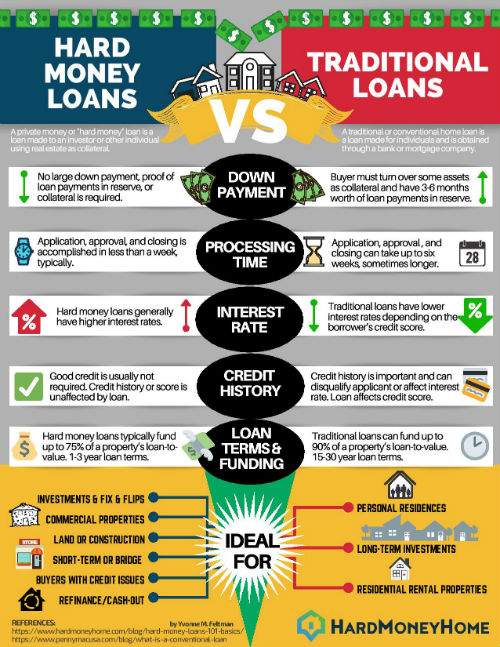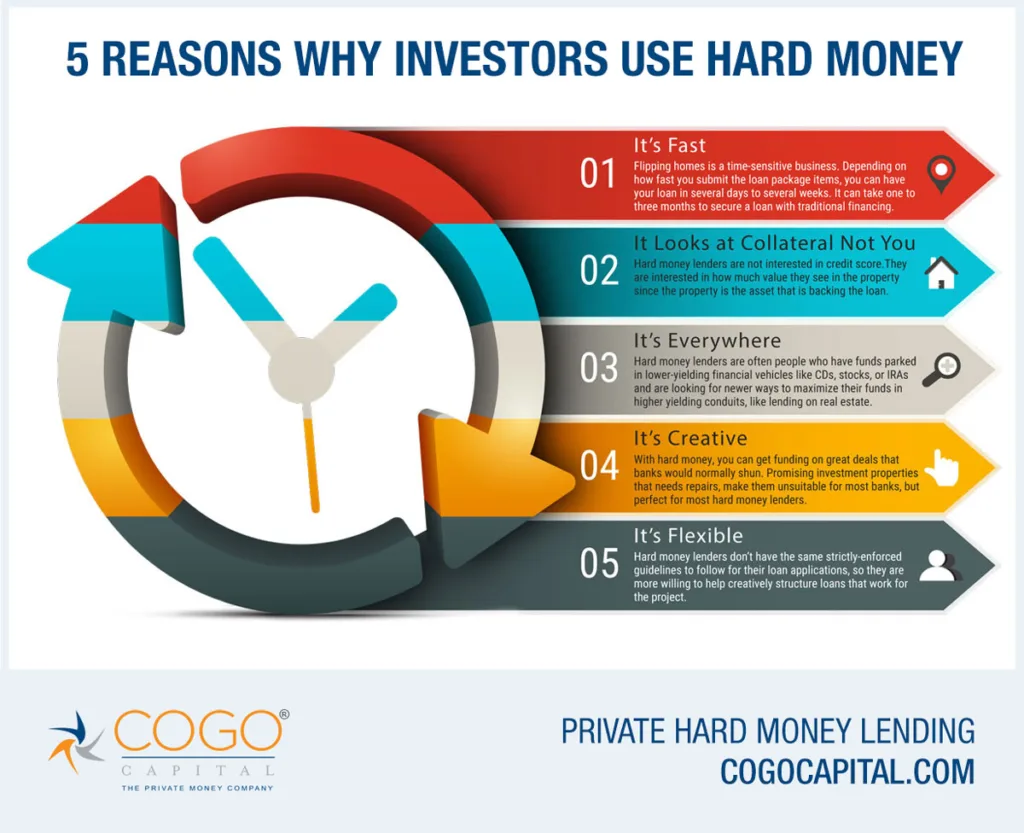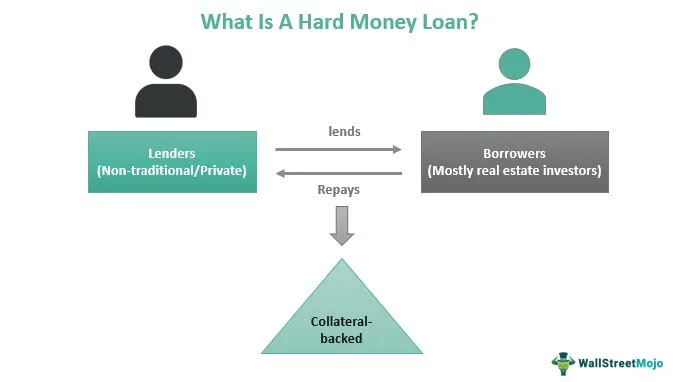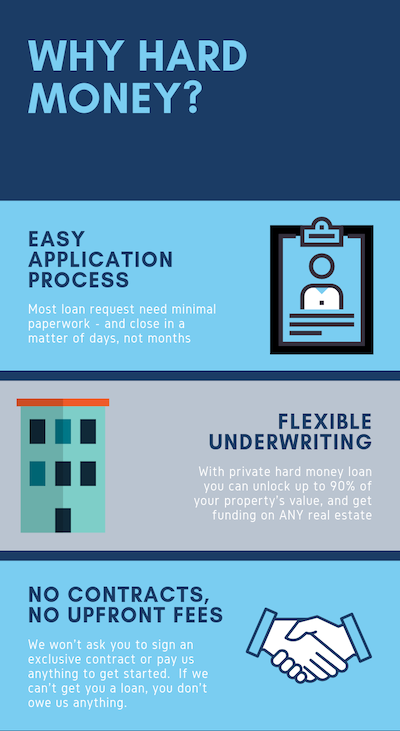If you’re looking for a flexible and efficient way to finance your next real estate project, understanding how a hard money loan works is essential. Unlike traditional bank loans, hard money loans are based on the value of the property rather than the borrower’s creditworthiness. In this article, you will learn about the key elements of a hard money loan, from the application process to repayment terms, allowing you to make informed decisions and maximize your investment potential.

What is a Hard Money Loan?
Definition of a Hard Money Loan
A hard money loan is a type of short-term financing option that is typically used by real estate investors or individuals who are unable to qualify for traditional bank loans. Unlike traditional loans, hard money loans are funded by private investors or lending companies that specialize in this type of alternative financing.
Hard money loans are secured by collateral, usually in the form of real estate, which means that if the borrower fails to repay the loan, the lender can take ownership of the collateral property. These loans are known for their quick approval and funding process, making them a popular choice for borrowers who need immediate financing.
Key Differences Between Hard Money Loans and Traditional Loans
There are several key differences between hard money loans and traditional loans. Firstly, while traditional loans rely heavily on the creditworthiness of the borrower, hard money loans are more focused on the value of the collateral property. This means that even if you have a poor credit history, you may still be able to qualify for a hard money loan if you have sufficient collateral.
Secondly, traditional loans typically have longer repayment periods, often spanning several years or even decades. On the other hand, hard money loans usually have much shorter repayment periods, ranging from a few months to a few years. The shorter repayment period allows lenders to mitigate their risk and recoup their investment quickly.
Lastly, traditional lenders such as banks and credit unions have strict application processes and extensive paperwork requirements. In contrast, hard money loans have a simpler and faster approval process. This is because hard money lenders focus less on the borrower’s financial history and more on the value and potential of the collateral property.
Understanding the Process of a Hard Money Loan
Application and Approval
The first step in obtaining a hard money loan is to complete the loan application. This application typically requires information such as your personal details, financial history, and details about the property you intend to use as collateral.
Once the application is submitted, the hard money lender will review it and assess the value and marketability of the collateral property. Unlike traditional lenders, hard money lenders often prioritize the collateral’s value over the borrower’s credit history. If the lender determines that the loan is a good investment, they will issue a Letter of Intent, stating their intent to provide financing.
Loan Terms and Conditions
After receiving the Letter of Intent, the borrower and lender will negotiate the terms and conditions of the loan. This includes determining the loan amount, interest rate, loan-to-value ratio (LTV), and repayment period. Hard money loans typically have higher interest rates compared to traditional loans to compensate for the higher risk involved.
The Loan-to-Value (LTV) ratio is an important aspect of hard money loans. It represents the percentage of the property’s value that the lender is willing to finance. For example, if the LTV ratio is 70%, the lender will fund 70% of the property’s appraised value. The LTV ratio is used to protect the lender’s investment in case of default.
Collateral and Loan-to-Value Ratio
One of the key factors in a hard money loan is the collateral property. The lender will require the borrower to provide collateral, usually in the form of real estate. This collateral acts as security for the loan and gives the lender the ability to recoup their investment if the borrower defaults.
The loan-to-value (LTV) ratio determines the maximum amount that the lender is willing to provide as a loan. This ratio is calculated by dividing the loan amount by the appraised value of the collateral property. For example, if the collateral property is appraised at $200,000 and the lender has an LTV ratio of 70%, the maximum loan amount would be $140,000.
The LTV ratio allows the lender to limit their exposure to risk by ensuring that the loan amount does not exceed a certain percentage of the property’s value. This protects both the lender and the borrower by ensuring that the collateral property has sufficient value to cover the loan amount.
Factors to Consider Before Taking a Hard Money Loan
Interest Rates and Fees
One important factor to consider when taking a hard money loan is the interest rate and associated fees. Hard money loans often have higher interest rates compared to traditional loans because they are considered higher risk for the lender. The interest rate can vary depending on the lender, the borrower’s credit history, and the perceived risk of the loan.
In addition to the interest rate, borrowers should also consider any origination fees, processing fees, and prepayment penalties that may be associated with the loan. These fees can add to the overall cost of borrowing and should be factored into the decision-making process.
Repayment Period
Another factor to consider is the repayment period of the hard money loan. Unlike traditional loans that may have repayment periods of several years or decades, hard money loans often have shorter terms. The repayment period can range from a few months to a few years, depending on the lender and the specific terms of the loan.
Borrowers should carefully consider their ability to repay the loan within the given timeframe. It is important to assess your financial situation and make sure that you have a clear plan for repaying the loan before taking on this type of financing.
Exit Strategy
Before taking a hard money loan, it is essential to have an exit strategy in place. An exit strategy is a plan for how you will repay the loan at the end of the term. This could involve refinancing the loan with a traditional lender, selling the property, or using other sources of funds.
Having a well-thought-out exit strategy is crucial to ensure that you can fulfill your obligation to repay the loan. Without a clear plan, you may find yourself in a difficult financial situation when the loan term ends.
Benefits of Hard Money Loans
Quick Approval and Funding
One of the biggest advantages of hard money loans is the quick approval and funding process. Traditional loans can take weeks or even months to be approved, whereas hard money loans can often be approved within a matter of days. This is especially beneficial for real estate investors who need to act quickly to secure a property.
The fast approval process is possible because hard money lenders focus less on credit history and more on the value of the collateral property. This allows borrowers to obtain the financing they need in a shorter amount of time, giving them a competitive edge in the real estate market.
Flexible Terms and Conditions
Hard money loans offer more flexibility in terms of loan terms and conditions compared to traditional loans. Since hard money lenders are private investors or lending companies, they have the ability to tailor the loan to suit the specific needs of the borrower.
This flexibility can be beneficial for borrowers who may not meet the strict requirements of traditional lenders. Hard money lenders can work with borrowers to determine the loan amount, interest rate, and repayment period that best fits their financial situation.
Less Dependent on Credit History
Unlike traditional loans, hard money loans are less dependent on the borrower’s credit history. Traditional lenders often place a significant emphasis on credit scores when assessing loan applications. Hard money lenders, however, focus more on the collateral property and its value.
This means that borrowers with less-than-perfect credit scores may still be eligible for a hard money loan, as long as they have sufficient collateral. This can be a huge advantage for individuals who have been unable to obtain financing through traditional channels due to their credit history.

Drawbacks of Hard Money Loans
Higher Interest Rates
One of the main drawbacks of hard money loans is the higher interest rates compared to traditional loans. Hard money lenders charge higher interest rates to compensate for the increased risk involved in lending to borrowers with less creditworthy backgrounds.
The higher interest rates can significantly increase the cost of borrowing, making hard money loans less attractive for borrowers who may qualify for lower-interest traditional loans. It is important to carefully consider the overall cost of borrowing and assess whether the benefits of a hard money loan outweigh the higher interest rates.
Shorter Repayment Period
Another drawback of hard money loans is the shorter repayment period compared to traditional loans. While this can be advantageous for lenders who want to recoup their investment quickly, it can be challenging for borrowers to meet the shorter repayment deadlines.
Borrowers must ensure that they have a realistic plan for repaying the loan within the given timeframe. Otherwise, they may face financial difficulties or be forced to seek alternative sources of financing once the loan term ends.
Potential for Limited Funding
Hard money loans may also have limitations when it comes to the amount of funding available. While the specific amount will depend on the lender and the value of the collateral property, hard money loans typically have lower loan-to-value ratios compared to traditional loans.
This means that borrowers may only be able to secure a portion of the property’s appraised value as a loan. If you require a significant amount of funding, a hard money loan may not be the most suitable option.
Real-Life Examples of Hard Money Loan Usage
Real Estate Flipping
One common use of hard money loans is for real estate flipping. Real estate flipping involves purchasing a distressed property at a low price, making renovations or improvements, and then selling it quickly for a profit.
Hard money loans are particularly attractive for real estate flippers because of their quick approval and funding process. Flippers can secure financing within a short period, allowing them to acquire properties and start the renovation process without delays.
Construction and Renovation Projects
Hard money loans are also commonly used for construction and renovation projects. Whether you are a property developer or a homeowner looking to renovate, obtaining traditional financing for construction and renovation projects can be challenging. Hard money loans provide an alternative solution for accessing the necessary funds quickly.
These loans allow borrowers to obtain the financing needed to cover construction costs, purchase materials, and pay contractors. Once the project is complete, the borrower can either sell the property or refinance the hard money loan with a traditional lender.
Bridge Financing
Another real-life example of hard money loan usage is bridge financing. Bridge financing is often used in real estate transactions where there is a time gap between the purchase of a new property and the sale of an existing one.
Homeowners or investors who find their dream property can use a hard money loan to bridge the gap between the purchase and sale of the properties. Once the existing property is sold, the proceeds can be used to repay the hard money loan.

Choosing the Right Hard Money Lender
Researching Lender Reputation
When choosing a hard money lender, it is crucial to research their reputation. Look for lenders who have a track record of funding similar projects and have positive reviews from previous borrowers. This will give you confidence that the lender is reputable and trustworthy.
You can also consider seeking recommendations from other real estate investors or professionals in the industry who have experience with hard money lending. Their insights can guide you towards reputable lenders and help you make an informed decision.
Comparing Interest Rates and Fees
Interest rates and fees vary among different hard money lenders, so it is essential to compare multiple options. Obtain quotes from different lenders and carefully review the interest rates, origination fees, processing fees, and any other associated costs.
By comparing the rates and fees, you can determine which lender offers the best terms and conditions for your specific needs. Remember to consider the overall cost of borrowing, including both the interest rates and fees, when making your decision.
Reviewing Borrower Requirements
Each hard money lender will have specific borrower requirements that you need to meet in order to qualify for a loan. These requirements can vary from lender to lender, so it is important to review them carefully before submitting an application.
Common borrower requirements may include a minimum credit score, a certain level of experience in real estate investing, or a minimum down payment. By reviewing the borrower requirements, you can ensure that you meet the eligibility criteria and increase your chances of being approved for a hard money loan.
Steps to Obtain a Hard Money Loan
Determine Loan Amount and Purpose
The first step in obtaining a hard money loan is to determine the loan amount you need and the purpose of the loan. Assess your financial situation and the specific project or investment you are undertaking to determine how much funding you require.
Having a clear understanding of the loan amount and purpose will help you communicate your needs effectively when approaching potential lenders.
Gather Required Documents
When applying for a hard money loan, you will need to gather the necessary documents to support your application. While the specific requirements may vary among lenders, common documents typically include:
- Personal identification documents, such as a driver’s license or passport
- Financial statements, including bank statements, tax returns, and proof of income
- Property documents, such as the purchase agreement, property appraisal, and title documents
- Construction or renovation plans, if applicable
Make sure to check with the lender to determine the exact documents they require and to ensure that you have everything ready for the application process.
Submit Loan Application
Once you have gathered all the required documents, you can submit your loan application to the chosen hard money lender. Be prepared to provide detailed information about yourself, your financial history, and the collateral property.
The lender will review your application and assess the potential value of the collateral property. If they determine that the loan is a good investment opportunity, they will issue a Letter of Intent or similar document expressing their intent to provide financing. This will be followed by further negotiations to finalize the loan terms and conditions.

Alternatives to Hard Money Loans
Traditional Bank Loans
While hard money loans offer certain advantages, traditional bank loans remain a viable alternative for borrowers who meet the creditworthiness requirements. Traditional bank loans typically have lower interest rates and longer repayment periods, making them more suitable for borrowers who can qualify for this type of financing.
Borrowers with good credit scores, stable income, and a proven track record in the real estate industry may find traditional bank loans to be a more cost-effective option compared to hard money loans.
Private Money Lenders
Private money lenders are another alternative to hard money loans. These lenders are individuals or organizations that provide financing to borrowers based on their private funds.
Like hard money lenders, private money lenders often have more flexible lending criteria compared to traditional banks. However, they may still require collateral and charge higher interest rates than traditional lenders. Private money lenders can be a good option for borrowers who need quick financing but do not meet the strict requirements of traditional lenders.
Joint Venture Partnerships
Another alternative to hard money loans is entering into joint venture partnerships. A joint venture partnership involves pooling resources and expertise with another individual or company to fund a real estate project.
By partnering with someone who has the necessary funds or skills, you can access the financing and support needed for your project without relying on a hard money loan. Joint venture partnerships can be beneficial for both parties, as they allow for shared risks and rewards.
Conclusion
In conclusion, hard money loans offer a unique financing solution for individuals who are unable to qualify for traditional bank loans. These loans are secured by collateral, typically in the form of real estate, and prioritize the value of the collateral over the borrower’s credit history.
While hard money loans have higher interest rates and shorter repayment periods compared to traditional loans, they offer quick approval and funding, flexible terms and conditions, and are less dependent on credit history. They are commonly used for real estate flipping, construction and renovation projects, and bridge financing.
When choosing a hard money lender, it is important to research their reputation, compare interest rates and fees, and review borrower requirements. The process of obtaining a hard money loan involves determining the loan amount and purpose, gathering the necessary documents, and submitting the loan application.
If a hard money loan is not suitable, alternatives such as traditional bank loans, private money lenders, and joint venture partnerships can be considered. Ultimately, borrowers should carefully evaluate their needs and options before choosing the most appropriate financing option for their specific situation.




